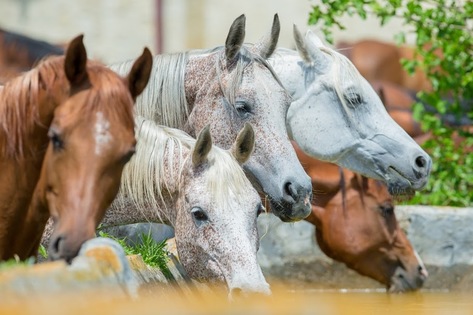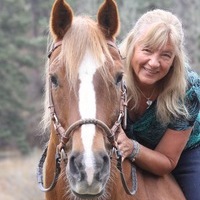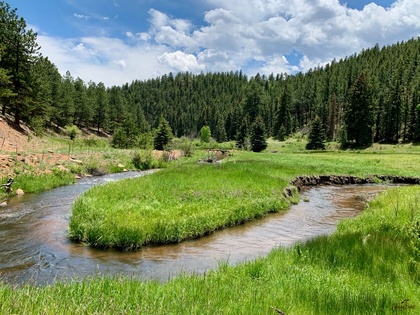
The Most Popular Horse Breeds Of 2019
Equestrian Advice & Guides General Equestrian
Build your business profile for FREE and expose your services to thousands of potential clients!
Create my profile now!
With the ever-increasing worldwide spread of the Covid-19 virus, we are seeing changes in our everyday lives in unprecedented ways, including how we care for and interact with our horses and the human teams we have to care for them. And we’ve adjusted and are still adjusting, and it’s not easy, but we are muddling through. There are many articles, blogs, memes, groups and individuals offering advice on how to manage your privately owned horses and/or your boarding, training, or breeding facility. How do we handle the stress and stay sane?
First, what IS stress? Gary Zukav defines it loosely in this manner: stress is resistance.
Imagine you are standing on top of a high cliff overlooking a lazy river winding through a lush valley below. Birds float above, trees gently sway in an unseen breeze. You smile and admire the sheer beauty of the scene and sand a few photos. You are in awe of how serene it is and you feel peaceful, so you stand there a bit longer, and notice a dead tree among the green ones and you think to yourself, wow, if that tree weren’t dead, this would be perfect. And then you notice the river winding around a large boulder and you think, wow, if that boulder weren’t there, and if that tree was alive, it’d be perfect.
Gazing longer, you feel tenseness creep across your shoulders as a cloud drifts into your view, and you dread the shadow it will soon cast, and your photo will be ruined. If only it would go away! This is stress. You are resisting the current moment—which is always changing anyway—and you wish you could change what’s there in front of you, as well as what will happen in the near future.
So, let’s flip it and look at the scene again. There are dead trees. The sky is filling with puffy white clouds. The river flows around the boulder and ripples just beyond. Does it really need to be changed to be better or to give you a nicer photo?
Look closer: The dead trees are home to squirrels and birds are nesting in them. They house ants near their roots. The clouds will bring rain to swell the river, and the green lush grasses will grow taller, feeding elk, deer and moose. Those larger animals bring in larger predators and the predators leave remains that are eaten, utilized and recycled right back into the ecosystem. So really, if you changed the things you didn’t like, the entire scene would end.
Fine, great, you think to yourself; what does this have to do with the fact that a plague is upon the world, people are dying left and right, and life as we’ve known it has come to a screeching halt? Add in your worry for your horses and other animals. Your mind screams, What if? What if?
Overcoming the hurdle that encompasses the stress and fear of what might happen can paralyze any of us. Add in the natural resistance to what is, in hopes for what was, or what may be, and the feeling of hopeless helplessness can threaten our daily existence in a way we’ve not known before.
Reorganizing our perspective, looking deeper than the superficial and digging down another layer into ourselves and we begin to understand what to do, how to change our view regarding this new reality. Also, remember, it’s temporary; everything is temporary. In the scene above, it will rain, and then the sun will once again shine and flora and fauna will flourish. And again, you ask, so what?
The answer to resistance is acceptance, and with acceptance, comes freedom. This doesn’t mean that we lie down and accept our ultimate demise. The willingness to accept what we have no control over, though, can help ease us back into a calm space where we are able to relax again. So how does one get to the Acceptance stage easily, quickly and without pain? The answer is not the same for any two people but the shortcut is to stop resisting. Simple, huh?
If you Google stress and how to get rid of it, you’ll get all the same answers and the lists are almost identical. So go ahead and do that and I won’t list them here. No point in repeating the list since we’ve all heard it before. However, if it worked to simply do what is recommended on these lists, everyone would exercise outside, then happily come in refreshed and sit down in front of a nice scented candle, breathing deeply, not drinking alcohol, caffeine or energy drinks. But seriously, we aren’t seeing those results, are we? So here are some other thoughts on what helps me and how I, personally approach the issue. For some, this will resonate, for others, perhaps not. The journey is individual. For me:
Embracing my own resistance helps clarify it for me.
When I feel stressed, whatever I’m feeling, I FEEL IT deeply and wholly.
If I need to, I cry until I can’t cry anymore.
I do not try to hide my feelings from myself.
I avoid drugs (including alcohol) offered to help NOT FEEL IT.
Exercising, for me, is helpful because I think better when I’m moving. Try it!
I unplug from social media, the news and focus instead, on happy things; horse things.
By dissecting the emotion triggered, most times I can move through the emotional to the logical and plan a way past the feeling of helplessness, fear and stress.
Getting to the logical part of the equation is easy if we look at the everyday things we must accomplish for our horses; feeding, grooming, mucking, and riding. Because of this, we “horse people,” have an edge on those who don’t have horses. Horses keep us focused in the present moment. We can also ask the horse for help and all they have to do is just be themselves. No performance requirements, no riding needed, although the change in perspective from atop my horse is quite helpful.
As horse owners, we may keep our horses at home or we may board at a private facility. If your horses are at home, it is much easier to take control over the daily care and interactions you share with him. If your horse is boarded, you are at the mercy of whatever rules your barn owner/manager initiates. The important thing is to keep physical distancing, stay healthy, keep others healthy, and learn to enjoy this new norm.
Part of our underlying worry is for the well-being of our horses and the other animals in our care. Fear is the culprit that makes us feel helpless and taking control in whatever manner we are able makes us feel better and allows us to concentrate on matters that we must. There are some easy fixes as to how to handle the fear we all feel and to take control.
It all comes down to preparation. Are we prepared? And remember that we can’t account for every contingency, but for our horses and other animals, we can set things up in such a way that we can be secure in the knowledge that they are safe and will continue to be so.
Safety for all involved must come first and this includes your horse, his veterinarian, farrier, massage therapist, chiropractor, trainer, exercise rider, stable worker, hay supplier and anyone else who comes into contact with him, and yourself. This means you may need to follow a different protocol than you are used to. Like, maybe your farrier asks you to leave a check, but not be present. Your veterinarian may ask to delay the spring shots and floats. Your trainer may work your horse while you watch from the sidelines.
For your own peace of mind, you may want to set up a will and trust for your animals in the event you succumb to the Covid-19 virus, but really, it’s something to think about having in place anyway. This precaution sounds worse than it is as you ponder the chore, but in reality, the peace of mind you get from having it in place is priceless.
Another important aspect to self care and handling stress in this time of uncertainty is to nurture your own creativity, patience and quietude. Look for new and exciting ways to adapt to the changes you want to embrace. Be empathetic without letting the worry eat at your own soul and help anyone you are able to assist. Most importantly, be thankful for all you have, including your horses and other animals. Take time to sit in the sun and listen to the birds.
Bottom line, do what you are able and let go of the rest. Pointedly, none of us gets out of here alive anyway, so why not spend our days in a happy state surrounded by our families, including our animals? Lastly, this is temporary, as everything is temporary. Breathe, laugh, love, and enjoy the views, Happily Ever After!
~Tanya Buck
Want to chat? Contact me at www.TanyaBuck.com and send an email
Free stuff as usual! Today, Original Artwork by J. Cunningham, to be used as a wall hanging or cut to size as a bookmark! https://lp.constantcontactpages.com/su/THHlynw/bookmark

